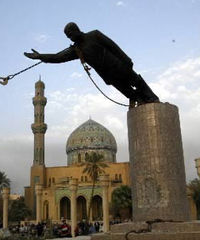As a Christian, I have extremely mixed feelings about
Tony Blair's latest assertion that God will be his judge over the Iraq war, with the implication that he believed he was acting on God's guidance in launching the invasion.
In what is becoming an increasingly post-Christian society, it is good to see God's existence being openly acknowledged by our Head of Government, and ultimately I would rather have a believer as Prime Minister than an avowed atheist such as Neil Kinnock.
But it is one thing to talk about your faith, and quite another to start discussing how it impacts on your decisions - especially those that involve sending other people to their deaths.
And much as I detest everything that Alastair Campbell stands for, I think he was right in advising the Prime Minister that, where the war in Iraq is concerned, he shouldn't "do God."
Perhaps Blair fails to realise that, on the question of pacifism, Christians divide fairly evenly between those, like John Stott, who do not believe war is ever justified in any circumstances, and those, like Dietrich Bonhoeffer, who believe it is sometimes a necessary evil.
And even within the latter camp, you would find no agreement that the Iraq conflict actually satisfied the conditions of a "just war," as for instance the war against the Nazis did in Bonhoeffer's case.
In his Parkinson interview, Blair sought to claim that he had tried to act in accordance with his conscience in all the events surrounding the war, which will no doubt have been heart-warming news for the family of Dr David Kelly.
Did Mr Blair's Government expose Dr Kelly because they were seeking to "obey God" - or was it because, in the words of the late Hugo Young, the Prime Minister's sainted integrity had become the core value his country had to defend?
Blair would not be the first politician to claim divine authority for his actions - Margaret Thatcher notoriously did so over her economic policies - but as
Martin Turner argues, no single political programme has a monopoly on Christian teaching.
And in any case, Blair should have more sense than to employ what is essentially the same defence as the one used by
Peter Sutcliffe.
Then again, may be he doesn't care any more - there was a definite valedictory air to his Parky interview, and I lost count of the number of times he referred to himself in the past tense.
Maybe the Prime Minister's willingness to talk about God in this way, in defiance of his old spin doctor's advice, is a sign that, at long last, he really has come to terms with his own political mortality.
March 8 Update:
Stephen Pollard has an alternative view of this in the course of which he describes this blog as "rather good." I was pleasantly surprised to receive this compliment as Pollard once turned me down for a job. I suppose I should now let bygones be bygones and give him a link on this site!








